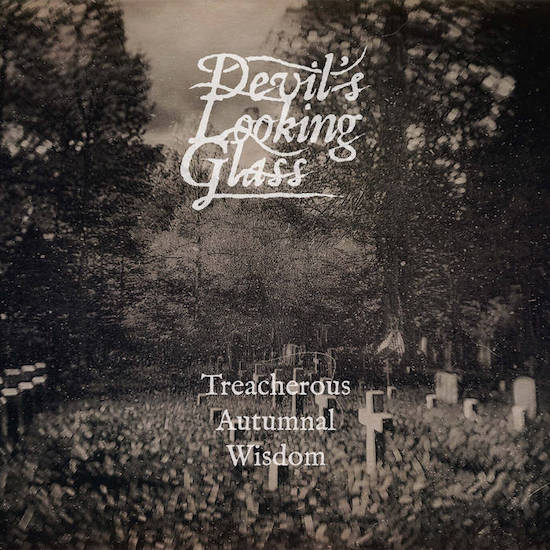
The Devil’s Looking Glass is an old name for a jagged, vertical rock face that stands about 800 feet above a bend in the Nolichucky River in Unicoi County, northeastern Tennessee. The Nolichucky River is itself called The Devil’s Run or The River of Death because of the number of lives lost in its turbulent waters. The rock face is steeped in frightening and haunting lore. According to one source:
The rock formation locally known as The Devil’s Looking Glass claims its name from Cherokee Indians who could make out a terrible face when the moonlight shined on the rock face from a certain angle. Even in daylight, when the shadows fall just right, an evil face can be discerned. Some say more than one face can be seen. The Cherokee believed the rock face was a window into the netherworld, the abode of the devil, and they could see him looking out, as though he were looking at himself in a mirror…. Some travelers and sportsmen claim to see ghostly apparitions around the rock face or along the river below at night.
Another source reports: “Local folklore tells of cries of agony heard coming from the rocks and tales of an Indian woman who leaped from the top of the cliff upon learning her love had died in battle; she is said to now haunt the base of the cliff…. It’s not a place for the faint at heart”.
Devil’s Looking Glass is also the name taken by a Tennessee band whose album Treacherous Autumnal Wisdom was released by Moonlight Cypress Archetypes last November. I don’t know for a fact that the band took their name for the haunted rock formation discussed above, but in listening to the music it would make sense if they did.

The album is off the usual beaten paths at this site. I learned of it because it’s the work of Ryan Clackner from the Tennessee band Primeval Well, who released one of my favorite albums of 2021 (earlier today I added a song from that album to our list of 2021’s Most Infectious Extreme Metal Songs). If you’re familiar with that album, Talkin’ In Tongues With Mountain Spirits, you’ll know that part of what makes it so distinctive is its integral incorporation of Appalachian mountain music and folk instruments and singing into a framework of black metal.
In a sense, Treacherous Autumnal Wisdom is an “inversion” of that album, with country folk music in the dominant position and a bit of black metal at the edges. The label that released both albums (Moonlight Cypress Archetypes) has referred to it as “in some ways a response” to Primeval Well‘s 2021 release.
Treacherous Autumnal Wisdom winds its way through 15 songs, including a mix of original and traditional compositions, and you’ll be able to detect some overlaps with Primeval Well‘s latest music.
“This Same Time” sets the stage with a vibrant, rippling banjo melody and mountain singing — in which the abrading crackle of harsh vocals join in the background, underscoring the devilish elements of the music. From there the songs twist and turn through different tempos, moods, and instrumental accents. Some sound like forlorn laments, some seem wistful, some dance in sprightly tones, others will put a cold chill on your skin.
In some, acoustic guitar (either solo or in layers) is the principal instrument, in others it’s the banjo again, in some it’s both. In “Am I Born To Die” the accompaniment sounds like a bitter wind blowing. Sounds of bowing begin “Higher Self”, which then unfolds in unnerving, doom-stricken electric arpeggios. There might be a bit of fiddle in the night-dark closing song.
The principal vocals are still cleanly sung, manifesting that authentic old-time country sound, but still vary depending on the music’s emotional core. And those rasping and gasping black metal vocals continue to surface here and there, reminding us that the demon still hovers in the shadows.
The album is also interspersed with short instrumental interludes, wisps of psychedelic and bluesy electric guitar soloing which sound improvisational. Some of the longer tracks (such as “Sandy River Belle”, the aforementioned “Higher Self”, and “Last Chance”) are themselves instrumentals.
The songs do twist and turn as you move from one to the next, which is one reason why it’s so easy to get stuck in the album and stay with it. There’s magic in the music, and desolation, sounds of yearning and grief and even flurries of joy. And yes, it can be very haunting in different ways. The shadows are ever-present, even when the fires push them back for a time, and death waits there.
BANDCAMP:
https://devilslookingglass.bandcamp.com/album/treacherous-autumnal-wisdom
FACEBOOK:
https://www.facebook.com/devilslookingglass

No negativity, just very confused. I normally dig folk music, but I’m not sure where the black metal essence comes in and the random soloing, sounds like practice stuff everyone runs through: it seems way out of place. Maybe I’ll have to look more into this to understand better. Thanks!
This could have been a pure folk music album. The only black metal ingredients are the harsh rasping vocals that appear very briefly in some of the songs. Those could have been eliminated, as could the electric guitar soloing in those short interlude tracks. The artist had a reason for including those things, though I don’t personally know what it was. All any listener can do (including me) is react to the way they influenced the album experience. I come at it as someone who rarely listens to folk music of any kind any more, and listens to a ton of black metal and other extreme music. Probably for that reason, the harsh vocals not only didn’t bother me, but I thought added a dark and disturbing texture to music that was already dark in other ways. For me, the electric guitar soloing in the interludes functioned as just a break and a twist before resuming the journey. I thought they were interesting on their own, but more out of place in the album than the harsh vocal accents.
I dunno, OBRKTA, I think negativity is warranted a bit. I found Talkin’ In Tongues With Mountain Spirits to be brilliant, and I enjoy a fair amount of bluegrass, but the harsh vocals here come off as cartoony and unnecessary. I love the dark themes of Appalachia interpreted through country/bluegrass + black metal, but this album seems half-baked at best. Remove the harsh vocals and electric interludes and you’ve got a solid folk companion to PW. Then again, Primeval Well’s leap from their debut to Talkin’ bodes well for this project.
Even if I won’t come back to this album much, I appreciate the head’s up from Islander that it exists! We’ll still have Primeval Well, Vital Spirit, Nechochwen, Panopticon, Gravetrails, and others to enjoy.